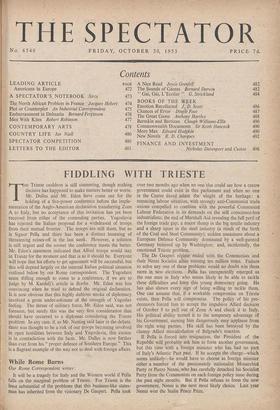FIDDLING WITH TRIESTE
THE Trieste cauldron is still simmering, though nothing decisive has happened to make matters better or worse. Mr. Dulles and Mr. Eden have come out for the holding of a five-power conference before the imple- mentation of the Anglo-American declaration transferring Zone A. to Italy, but no acceptance of this invitation has yet been received from either of the contending parties. Yugoslavia has rejected the Italian proposal for a withdrawal of troops from their mutual frontier. The troops are still there, but so is Signor Pella and there has been a distinct lessening of threatening noises-off in the last week. However, a solution is still urgent and the sooner the conference meets the better. Mr. Eden's statement indicated that Allied troops would stay in Trieste for the moment and that is as it should be. Everyone will hope that his efforts to get agreement will be successful, but this will depend largely on the internal Italian political situation outlined below. by our Rome correspondent. The Yugoslays seem NCIling enough to come to a conference, if we are to judge by M. Kardelj's article in Borba.. Mr. Eden was less convincing when he tried to defend the original declaration. It is now obvious that this highly dubious stroke of diplomacy involved a gross under-estimate of the strength of Yugoslav feeling. The threat of military force, Mr. -Eden said, was not foreseen, but surely this was the very first consideration that should have occurred to a diplomat considering the Trieste problem. In any case, if, as Mr. Nutting said later in the debate, there was thought to be a risk of our troops becoming involved in open hostilities between Italy and Yugoslavia, this excuse is in contradiction with the facts. Mr. Dulles is now further than ever from his " proper defence of Southern Europe." This is a flagrant example of the way not to deal with foreign affairs.


































 Previous page
Previous page